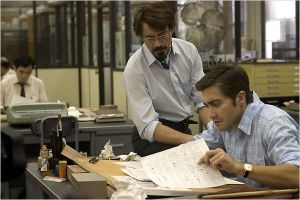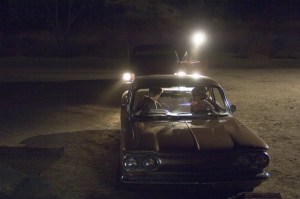Originally Posted June 27th, 2010
For two years, the San Francisco Bay area staged a desperate manhunt to stop the man responsible for a series of bizarre and brutal murders, between 1969, and 1971. In cryptic letters to newspapers, the killer boasted of his attacks, and made a variety of new threats involving school buses and bombs. The man, calling himself The Zodiac, would become a lightning rod for a restless American psyche otherwise occupied with the ongoing war in Vietnam. Yet, before any arrest could be made, the letters stopped, and The Zodiac vanished. With only one other authentic letter appearing in 1974, the crimes of the bay area boogeyman would quickly fade from public consciousness. To this day, the case remains open in three counties, and no arrest has ever been made.

The "one that got away" is a common component of police procedurals, usually involving a burnt out dick warning another detective not to get too deep into the job when doggedly pursuing of a killer. Losing oneself in a mystery can come at the cost of relationships and sanity. The next time you tell someone a really good brain teaser, keep the answer to yourself and see how long it takes for them to try and pry it out of you. This is probably the main reason why filming the story of the Zodiac murders has taken more than thirty years. The killings were shocking, twisted, and captivating, which are buzzwords most producers like to see on a poster. The problem: any film about Zodiac would have no ending. To this day, the true identity of The Zodiac is unknown. Now, imagine how frustrating Se7en would have been if it had ended without ever revealing the killer's identity. So it’s no small feat that David Fincher has taken the investigation that never ended and turned it into one of the best films of the last decade.
Zodiac’s greatest strength, and some would argue its greatest weakness, is its commitment to portraying the events surrounding case as truthfully as possible. The film is based on the real life accounts of Robert Graysmith, who was a cartoonist at the San Francisco Chronicle during the height of the attacks. Graysmith (played by Jake Gyllenhaal) would become more and more involved in the case as the police investigation died down. His novel of the same name is the blueprint for Fincher’s version, and it is replicated in painstaking detail. Even some of the stranger facts, such as the curiously large number of sweaters worn by Zodiac victim Michael Mageau, are included to make the stranger than fiction details of this real case all the more puzzling.

The film covers more than twenty years, starting with the first Zodiac letters and extending all the way into the 1990’s. In retelling the accounts chronologically, the majority of the film’s action sequences take place within the first hour, and even then there are only a handful. By the time lead detective Dave Toschi (Ruffalo) appears to investigate the one and only confirmed Zodiac killing in San Francisco, audience members should be prepared for an onslaught of the red stuff, and I mean tape, not blood. This is a film where the big police victory isn’t getting the man, but is instead getting a warrant. The attention to detail given to the investigation will probably discourage viewers used to watching police paperwork covered in a quick montage. “No need for due process right,” jokes Toschi after watching Dirty Harry, whose villain was based on Zodiac. While certainly less sexy than an episode of CSI, putting the viewer in the thick of the investigation’s minutiae properly emphasizes how easy it is to get crushed under the day-to-day of working on one case.
It’s difficult to convey to viewers how exhausting time can be in a film. A fade out can cover unfathomable amounts of time in a matter of seconds, with the audience being no worse for wear. Spanning more than three decades, Zodiac is one of those rare films that makes you feel the weight of time passing as the investigation begins to slow down. At over two and a half hours, Zodiac will test your endurance. A skyscraper is literally built before your eyes during the time between major breaks in the case. In a brilliantly constructed transition, darkness is set to the cycling sounds of pop songs and headlines from 1972, through 1977, covering America’s “Horse with no name” to The Ohio Player’s “Love Rollercoaster”. In that time, the war in Vietnam ended, and America had a new pet serial killer, the Son of Sam (who had a TV movie less than a decade after being arrested). By the third act, it seems like everyone, including Zodiac, has moved on.

This is where the film picks up speed and moves from police procedural into territory more commonly found in modern thrillers, with Gyllenhaal’s Graysmith taking over the investigation. There’s still plenty of paperwork mind you, but as Graysmith and the case slowly start to unravel, there’s a sense of foreboding that gives reading old police reports a kinetic energy bordering on full-blown frenzy. Gyllenhaal proved himself capable of a slow-burn performance in DonnieDarko, but here, his transition from boy-scout cartoonist to obsessed detective is backed by visible signs of depletion, as his fresh face slowly darkens from restless nights spent hunting a killer the world has forgotten. The soundtrack shifts from era appropriate pop songs to morbid piano pieces, all while San Francisco is caught in a never-ending rainstorm. It’s not long before Graysmith begins receiving mysterious phone calls, and it appears his life is in danger. The tension reaches a crescendo in a scene inside a California basement. It’s one of the most suspenseful and terrifying ever filmed.
Beyond the facts of the Zodiac case, the film reaches into some fairly well worn territory about the way police work stresses relationships with family or coworkers. The friendship between Graysmith and criminal reporter (and one-time Zodiac target) Paul Avery (Downey Jr.) is mostly fictionalized, but their various tête-à-têtes make for some light comic relief. If Fincher is to be faulted with anything, it’s that he cheats a bit with his ending. The film gives a certain amount of closure to the killer’s identity, which, while true to Graysmith’s book, doesn’t properly do justice to the reality, which is far more intriguing. I had never heard of the Zodiac murders until watching this movie, and in a way, I wish I never had. The world let go, and it seems that we’ll never know the truth behind who the Zodiac really was. It’s an answer that I may not like, but it’s one I won’t be forgetting anytime soon.
5 out of 5
Directed by David Fincher
2007, USA

